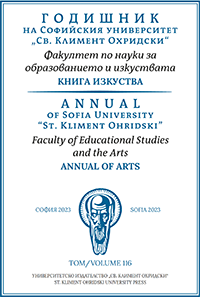МУЗИКАТА И ИДЕИТЕ НА РИХАРД ВАГНЕР, ОТРАЗЕНИ В БЪЛГАРСКОТО КУЛТУРНО ПРОСТРАНСТВО ОТ КРАЯ НА XIX И ПЪРВАТА ПОЛОВИНА НА ХХ ВЕК
THE MUSIC AND THE IDEAS OF RICHARD WAGNER, REFLECTED IN THE BULGARIAN CULTURAL SPACE FROM THE END OF THE XIX AND THE FIRST HALF OF THE XX CENTURY
Author(s): Boryana MangovaSubject(s): Theatre, Dance, Performing Arts, Fine Arts / Performing Arts, Music, History of Art
Published by: Софийски университет »Св. Климент Охридски«
Keywords: Richard Wagner; tsar Ferdinand I; opera; musical drama; Leitmotiv; Der Fliegende Holländer; Tannhäuser; Lohengrin; Venedikt Bobchevski
Summary/Abstract: The present study covers the presence of Richard Wagner in the sense of real-sounding music, Compositional, Aestetic and Philosophical views in the various spheres of the cultural life of the Third Bulgarian Kingdom. The earliest information about performances of Wagner’s work in Bulgaria dates back to 1880 in the field of choral and chamber- instrumental ensembles seeking contact with the music of the Great Maestro. The reign of Prince/ Tsar Ferdinand (1887– 1920) undoubtedly stimulated the unclusion of orkestral fragments, overtures or phantasies from the composer’s operas and musical dramas in the Repertoire of Sofia Court Orchestra and in the programs of provincial bands with the edition of full time string section. Factors for building un understanding of Wagner’s ideas and music are also: a) the performances of German opera companies that presented two of his three middle period operas: Der Fliegende Holländer and Lohengrin as early as 1910; b) the growth of Bulgarian musicians – singers, instrumentalists, directors, conductors, musicologists etc., educated abroad, in Austria, Germany, Italy, Russia; c) the growth of highly educated Bulgarian intellectuals, open to the philosophical, aestetic and art history trends of modernism from the end of the XIXth and the first half of the XXth century. The publications of this Bulgarians with European knowledge/ consciousness support the growth of our society to the level of Wagner’s music, of his theoretical, theatrical and social ideas.
- Issue Year: 116/2023
- Issue No: 4
- Page Range: 27-50
- Page Count: 24
- Language: Bulgarian

